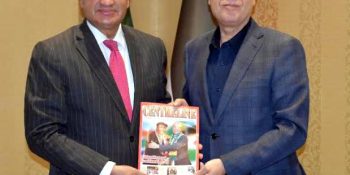Wednesday, March 6th, 2024
9 percent of Pakistanis being wasted to smoking

ISLAMABAD, MAR 6 /DNA/ – The uphill task for the new government is to synchronize efforts of health and finance ministries to counter the menace of smoking. With 24 million active tobacco users, Pakistan is among the world’s top tobacco-consuming countries, says a report prepared by Pakistan Institute of Development Economics (PIDE). Capital Calling, a think tank, has stated in a report that Pakistan has become a breeding ground for multinational cigarette companies. As a result, the markets are filled with cheap and illicit cigarettes. According to an estimate, cigaretteRead More
PM, COAS discuss security, army’s professional matters

ISLAMABAD, MAR 6 /DNA/ – Chief of the Army Staff General Syed Asim Munir on Wednesday called on Prime Minister Shehbaz Sharif here at the Prime Minister’s House. In the meeting, they discussed the Pakistan Army’s professional as well as the security-related matters, a PM Office press release said. The army chief also congratulated Prime Minister Shehbaz on assuming the office and expressed good wishes for him.
Centreline/Daily Islamabad POST Editor presents special report on Gaza to Ambassador Ahmed Rabei

ISLAMABAD, MAR 6 /DNA/ – Chief Editor Centreline/Daily Islamabad POST Ansar Mahmood Bhatti presenting a copy of Centreline magazine, which carries a special report on Gaza, to Ambassador of Palestine Ahmed Rabei. The Ambassador briefed the senior journalist about the latest Gaza situation. The Ambassador thanked the government and the people of Pakistan for extending whole-hearted support to Palestine at this particular juncture. =DNA
Islamabad Marriott Hotel Launches ‘Kiku’: A Gateway to Authentic Japanese Cuisine

DNA The Islamabad Marriott Hotel has announced the grand opening of ‘Kiku’, an elegant new addition to Islamabad’s culinary scene. The inauguration ceremony was attended by the Ambassador of Japan, H.E. Mr. WADA Mitsuhiro, who expressed his delight and endorsement of Kiku as “the only authentic Japanese restaurant in Islamabad.” The restaurant’s name, Kiku, translates to ‘chrysanthemum’ in Japanese, a symbol of rejuvenation and nobility, reflecting the restaurant’s commitment to providing guests with an authentic and exquisite dining experience. The restaurant offers a meticulously curated menu of contemporary Japanese cuisine,Read More

